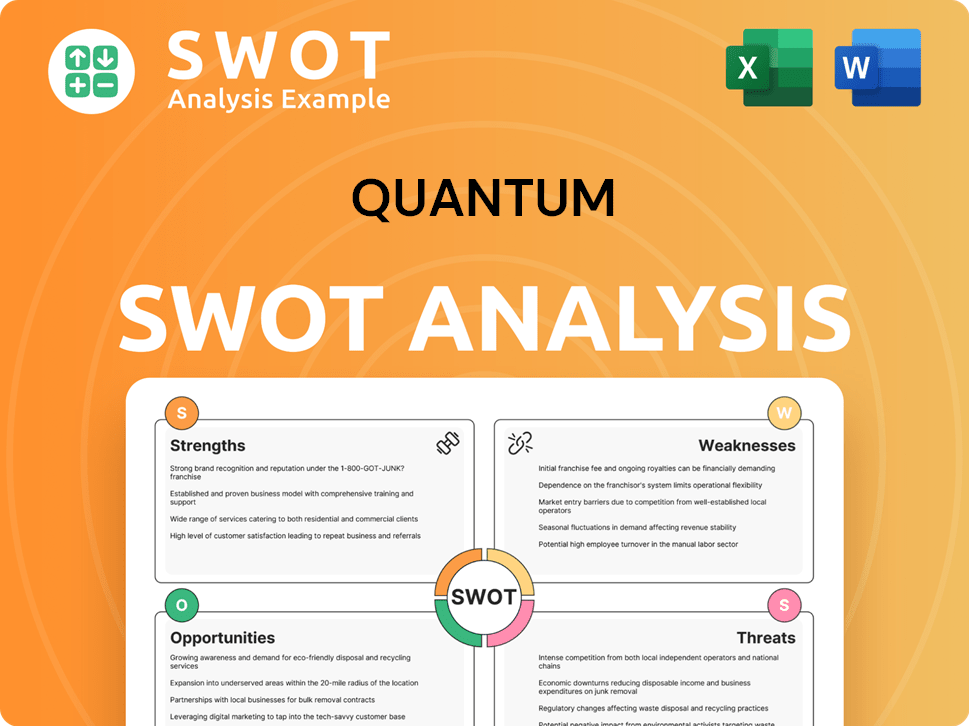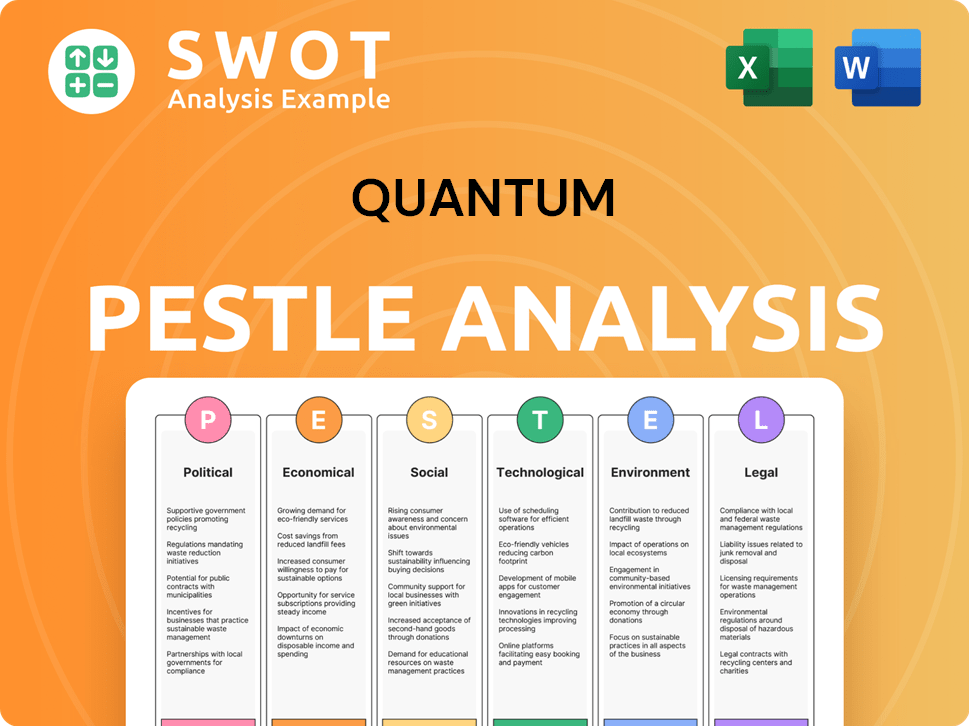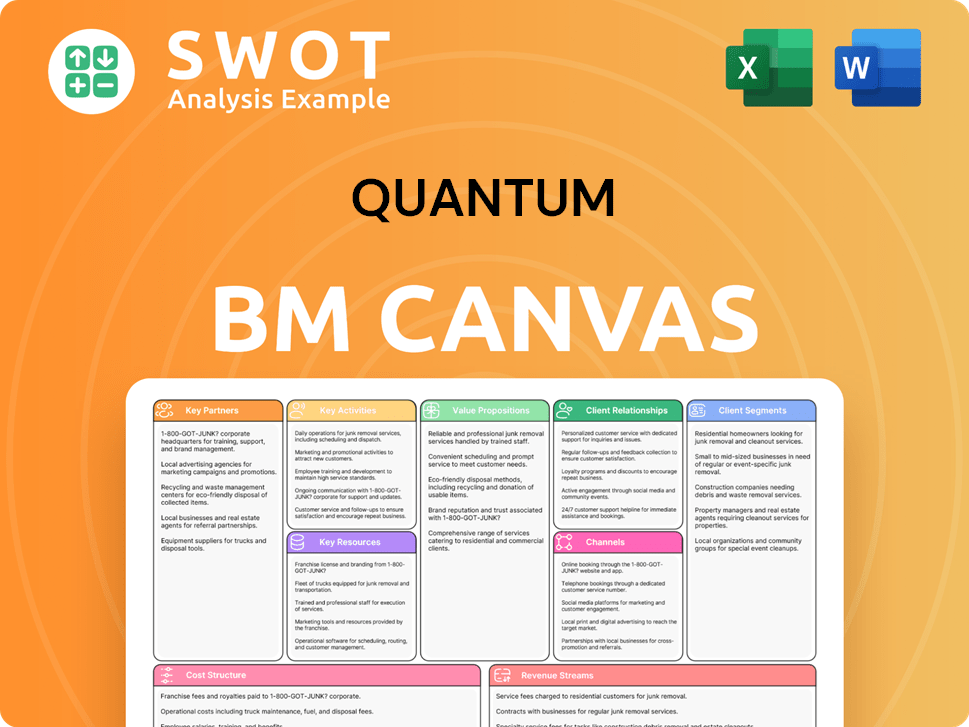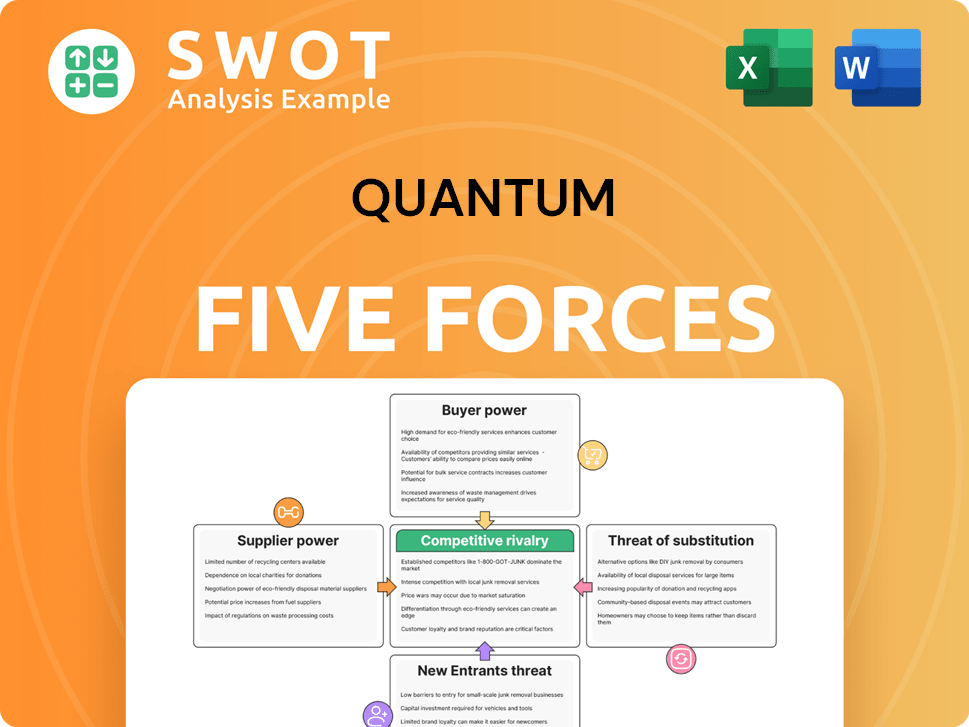Quantum Bundle
Can Quantum Corporation Thrive in the Quantum Computing Landscape?
The digital world is drowning in data, and Quantum Corporation has emerged as a key player in the data storage solutions sector. Founded in 1980, Quantum has evolved to specialize in solutions for video and unstructured data, offering essential storage platforms, software, and services. This strategic focus has positioned Quantum to capitalize on the growing need to manage and preserve vast digital assets.

To understand Quantum's position, we must explore the Quantum SWOT Analysis and its competitive landscape. This article provides a comprehensive analysis of the competitive quantum market, examining Quantum's key rivals and its unique competitive advantages. We'll also delve into the current quantum industry overview, future challenges, and opportunities shaping Quantum's trajectory, including key players in the quantum computing industry and market trends.
Where Does Quantum’ Stand in the Current Market?
The company holds a significant position within the data storage industry, particularly in video and unstructured data management. Its focus is on scale-out storage, archive, and data protection solutions tailored for high-volume data environments. Quantum's product lines include ActiveScale object storage, StorNext file system, and DXi backup appliances, along with software and services.
Quantum's geographic presence spans North America, Europe, and Asia, serving a diverse customer base in media and entertainment, government, scientific research, and surveillance. The company strategically shifted its positioning to focus more on the challenges of unstructured data, moving beyond traditional tape storage to embrace more advanced disk and object storage technologies. This pivot allows the company to capitalize on the increasing demand for solutions that can efficiently manage and preserve massive datasets.
Financially, the company reported revenues of $92.6 million for the third quarter of fiscal year 2024. Its focus on recurring revenue streams, particularly from software and services, is a key aspect of its current market strategy. While the broader data storage market is dominated by large conglomerates, Quantum has carved out a strong niche in specific high-growth areas, leveraging its expertise in managing complex unstructured data workflows. For more information about the company's ownership, you can read Owners & Shareholders of Quantum.
Quantum has a strong market position within the specialized segments of video and unstructured data management. The company is recognized for its leadership in scale-out storage, archive, and data protection solutions. While specific market share figures for 2024-2025 are subject to ongoing market analysis, Quantum's presence is well-established.
Quantum's primary product lines include ActiveScale object storage, StorNext file system, and DXi backup appliances. It also offers a comprehensive suite of software and services. These offerings are designed to meet the demands of high-volume data environments, catering to various industries.
Quantum's geographic presence spans North America, Europe, and Asia, serving a diverse customer base. Key industries served include media and entertainment, government, scientific research, and surveillance. This broad reach allows Quantum to address global market needs.
The company reported revenues of $92.6 million for the third quarter of fiscal year 2024. Its focus on recurring revenue streams from software and services is a key strategic element. Quantum aims to maintain a strong market position in high-growth areas.
Quantum has strategically focused on unstructured data management, moving beyond traditional tape storage. This shift aligns with the increasing demand for solutions that efficiently manage and preserve large datasets. The company's ability to adapt to market trends is crucial in the competitive quantum computing landscape.
- The company's focus on recurring revenue streams is a key aspect of its market strategy.
- Quantum has carved out a strong niche in specific high-growth areas.
- The company leverages its expertise in managing complex unstructured data workflows.
- Quantum's strategic pivot allows it to capitalize on growing market demands.
Quantum SWOT Analysis
- Complete SWOT Breakdown
- Fully Customizable
- Editable in Excel & Word
- Professional Formatting
- Investor-Ready Format

Who Are the Main Competitors Challenging Quantum?
The competitive landscape for Quantum Corporation is multifaceted, encompassing both direct and indirect competitors within the data storage market. Quantum faces challenges from established players and emerging technologies, requiring a strategic approach to maintain and grow its market position. Understanding the competitive dynamics is crucial for Quantum to make informed decisions about product development, pricing, and market positioning.
Quantum's ability to differentiate itself through specialized solutions and strategic partnerships is essential for navigating this competitive environment. The company must continually innovate and adapt to the evolving demands of the data storage market to remain competitive. The rise of cloud storage and software-defined solutions adds further complexity, necessitating a flexible and forward-thinking strategy.
Quantum operates in a competitive data storage market, facing rivals in both direct and indirect categories. Direct competitors offer similar products and services, while indirect competitors provide alternative solutions that address the same customer needs. The competitive dynamics are shaped by factors such as technological innovation, pricing strategies, and market positioning.
Direct competitors offer similar data storage solutions, competing directly with Quantum for market share. These companies often focus on specialized areas such as unstructured data and video storage, where Quantum also has a strong presence. Competition is fierce, driven by technological advancements and customer demands.
Indirect competitors provide alternative data storage solutions, such as cloud storage services. These companies compete by offering cost-effective and scalable options, challenging on-premises and hybrid solutions. The rise of cloud services has significantly impacted the competitive landscape.
Several factors drive competition in the data storage market, including pricing, innovation, and brand recognition. Companies must continuously improve their products and services to meet customer needs and maintain a competitive edge. Strategic alliances and mergers also play a significant role.
Market trends such as the increasing demand for data storage and the growth of cloud computing influence the competitive landscape. Companies must adapt to these trends to stay relevant and competitive. The focus on data security and compliance is also a key factor.
Strategic alliances and mergers reshape the competitive landscape by expanding capabilities and market reach. These partnerships enable companies to offer more comprehensive solutions and compete more effectively. The acquisition of companies by larger players is a common trend.
Quantum faces challenges from both direct and indirect competitors but also has opportunities to leverage its strengths. The company can focus on specialized solutions and strategic partnerships to differentiate itself. Adapting to market trends is crucial for long-term success.
A detailed analysis of Quantum's competitors reveals key strengths and weaknesses. This analysis helps identify areas for improvement and opportunities for growth. Understanding the competitive landscape is essential for developing effective strategies. For a deeper dive, you can check out Growth Strategy of Quantum.
- Avid Technology: Provides integrated solutions for media production, including storage.
- Dell Technologies: Offers a vast storage portfolio, including Isilon for scale-out NAS.
- NetApp: Provides a range of data management and storage solutions, especially in hybrid cloud environments.
- Amazon Web Services (AWS): Offers cloud storage services like S3 and Glacier.
- Microsoft Azure: Provides cloud storage solutions, including Blob Storage.
- Google Cloud Platform: Offers cloud storage services, such as Cloud Storage.
Quantum PESTLE Analysis
- Covers All 6 PESTLE Categories
- No Research Needed – Save Hours of Work
- Built by Experts, Trusted by Consultants
- Instant Download, Ready to Use
- 100% Editable, Fully Customizable

What Gives Quantum a Competitive Edge Over Its Rivals?
The competitive landscape for companies specializing in data storage solutions, such as the one in question, is shaped by a blend of technological innovation, market demand, and strategic positioning. A key aspect of a thorough quantum company analysis involves examining the specific advantages that set a company apart in this dynamic environment. These advantages can range from proprietary technologies and specialized expertise to strong customer relationships and established brand recognition.
Understanding the quantum computing landscape requires a deep dive into the specific technologies and services offered. This includes the company's focus on managing and preserving unstructured data, its proprietary file systems, and its object storage solutions. The ability to cater to specific industries, such as media and entertainment, surveillance, and scientific research, further defines its competitive edge. Moreover, the company's ability to adapt to industry shifts, such as cloud adoption, while maintaining its core strengths, is crucial for long-term success.
The competitive quantum market is also influenced by broader industry trends, including the increasing demand for scalable and cost-effective data storage solutions. The company's ability to innovate and adapt to these trends, while leveraging its existing strengths, is critical. This includes strategic partnerships, continuous product development, and a focus on providing integrated hardware, software, and services to create a strong ecosystem for its customers. The company's ability to navigate these challenges will be key to its continued success.
The company's proprietary StorNext file system is a significant competitive advantage. This technology provides high-performance, collaborative access to large unstructured data files, essential for its target industries. This, combined with ActiveScale object storage, offers a scalable and cost-effective solution for long-term archiving and data lifecycle management. These technologies are critical for managing the growing volume and complexity of data.
A deep understanding of its customer segments is another key advantage. The company has built strong relationships and developed solutions specifically tailored to the workflows of media production houses, research institutions, and surveillance operations. This specialization allows it to address specific pain points, such as real-time access to large files and efficient data sharing. This focus helps to foster customer loyalty.
The company benefits from its established brand equity within its niche markets, built over decades of providing reliable storage solutions. Its focus on integrating hardware with intelligent software and services creates a sticky ecosystem for its customers. This integrated approach enhances customer retention and provides a competitive edge. The company's long-standing presence in the market is a testament to its reliability.
To maintain its edge, the company actively leverages its expertise through strategic partnerships and continuous product development. This allows it to adapt to industry shifts, such as cloud adoption, while still focusing on its core strengths. This proactive approach ensures that it remains competitive in a rapidly evolving market. The company's ability to innovate is crucial for its long-term success.
The company's competitive advantages are rooted in its specialized expertise in managing unstructured data, particularly for high-value media, entertainment, surveillance, and scientific research workflows. Its proprietary StorNext file system and ActiveScale object storage provide scalable and cost-effective solutions. The company's focus on integrating hardware with intelligent software and services creates a sticky ecosystem for its customers.
- Proprietary StorNext file system for high-performance access.
- Deep understanding of customer needs in niche markets.
- Strong brand equity and established customer relationships.
- Focus on integrated hardware, software, and services.
Quantum Business Model Canvas
- Complete 9-Block Business Model Canvas
- Effortlessly Communicate Your Business Strategy
- Investor-Ready BMC Format
- 100% Editable and Customizable
- Clear and Structured Layout

What Industry Trends Are Reshaping Quantum’s Competitive Landscape?
The data storage industry, where Quantum operates, is experiencing significant shifts. The explosion of unstructured data, fueled by higher resolution video, the Internet of Things (IoT), and scientific research, is a major driver. Simultaneously, the move towards cloud computing and hybrid cloud strategies is reshaping the market, creating both challenges and opportunities for companies like Quantum. The increasing importance of data security, compliance, and protection against ransomware is also shaping the competitive landscape.
For Quantum, this means navigating intense competition, especially from hyperscale cloud providers. Staying ahead in rapidly evolving technologies like artificial intelligence (AI) and machine learning (ML), which require massive data storage, is crucial. Managing supply chain issues and adapting to global economic changes are also key. However, there are opportunities in expanding hybrid cloud offerings, developing AI-ready storage solutions, and growing in emerging markets undergoing digital transformation.
The primary trend is the exponential growth of unstructured data. The adoption of cloud computing and hybrid cloud strategies is also a significant factor. Data security and ransomware protection are becoming increasingly critical, leading to demand for robust storage solutions. These trends are reshaping the Quantum computing landscape.
Intense competition from hyperscale cloud providers poses a significant challenge. Continuous innovation to keep pace with AI and ML technologies is essential. Managing supply chain disruptions and adapting to global economic shifts will remain crucial. The Quantum company analysis must address these challenges.
Expanding hybrid cloud offerings presents a major opportunity. Developing AI-ready storage solutions can drive growth. Penetrating emerging markets undergoing digital transformation is also key. This positions the company well within the Competitive quantum market.
Quantum is focusing on solutions like ActiveScale Cold Storage for cost-effective data preservation. The company aims to innovate in unstructured data management and hybrid cloud models. This strategy is designed to strengthen its competitive position and capitalize on the demand for robust data storage.
Quantum needs to adapt to the changing demands of the data storage industry. This includes addressing the challenges posed by cloud providers and the need for continuous innovation. The company must capitalize on opportunities in hybrid cloud and AI-driven storage solutions.
- Focus on hybrid cloud solutions to meet growing demand.
- Develop storage solutions optimized for AI and ML workloads.
- Expand presence in emerging markets with high data growth.
- Invest in advanced data security and ransomware protection.
Quantum Porter's Five Forces Analysis
- Covers All 5 Competitive Forces in Detail
- Structured for Consultants, Students, and Founders
- 100% Editable in Microsoft Word & Excel
- Instant Digital Download – Use Immediately
- Compatible with Mac & PC – Fully Unlocked

Related Blogs
- What are Mission Vision & Core Values of Quantum Company?
- What is Growth Strategy and Future Prospects of Quantum Company?
- How Does Quantum Company Work?
- What is Sales and Marketing Strategy of Quantum Company?
- What is Brief History of Quantum Company?
- Who Owns Quantum Company?
- What is Customer Demographics and Target Market of Quantum Company?
Disclaimer
All information, articles, and product details provided on this website are for general informational and educational purposes only. We do not claim any ownership over, nor do we intend to infringe upon, any trademarks, copyrights, logos, brand names, or other intellectual property mentioned or depicted on this site. Such intellectual property remains the property of its respective owners, and any references here are made solely for identification or informational purposes, without implying any affiliation, endorsement, or partnership.
We make no representations or warranties, express or implied, regarding the accuracy, completeness, or suitability of any content or products presented. Nothing on this website should be construed as legal, tax, investment, financial, medical, or other professional advice. In addition, no part of this site—including articles or product references—constitutes a solicitation, recommendation, endorsement, advertisement, or offer to buy or sell any securities, franchises, or other financial instruments, particularly in jurisdictions where such activity would be unlawful.
All content is of a general nature and may not address the specific circumstances of any individual or entity. It is not a substitute for professional advice or services. Any actions you take based on the information provided here are strictly at your own risk. You accept full responsibility for any decisions or outcomes arising from your use of this website and agree to release us from any liability in connection with your use of, or reliance upon, the content or products found herein.